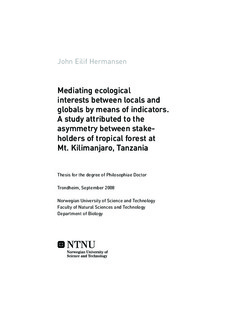| dc.contributor.author | Hermansen, John Eilif | nb_NO |
| dc.date.accessioned | 2014-12-19T13:11:36Z | |
| dc.date.available | 2014-12-19T13:11:36Z | |
| dc.date.created | 2010-06-23 | nb_NO |
| dc.date.issued | 2008 | nb_NO |
| dc.identifier | 326637 | nb_NO |
| dc.identifier.isbn | 978-82-471-1267-0 (printed ver.) | nb_NO |
| dc.identifier.isbn | 978-82-471-1269-4 (electronic ver.) | nb_NO |
| dc.identifier.uri | http://hdl.handle.net/11250/244685 | |
| dc.description.abstract | Communication of ecological and environmental knowledge, values and concerns by means of indicators and indices is now widely accepted and adopted as a part of environmental management systems, results-oriented politics and international reporting and benchmarking initiatives.
The departure for this thesis is the assumption that there is increasing asymmetry in understanding and control of forest ecosystem resources and services between the local, indigenous people as weak actors on one side and the globalized regime of science, international organisations and business as strong actors on the other. A model denoted Mediation of Ecological Semantics and Sustainability (MESS) is evolved as a contribution to the understanding of the meandering process between different kinds of ecology (soft, practical and hard) and environmental sustainability. The model is the basis for the suggested framework for a proximity-to-target forest ecology indicator.
This thesis presents ecological indicators based on a system of communication and mediation that is intended to provide more equity for local interests, and may support democratization and enlightenment. The indicator is supported by a methodology for development of a multipurpose ecologically-oriented forest management performance indicator system that also includes stronger participation of local people in defining and mediating the value of tropical forests. With the intention of supporting an open and interactive management system, this aggregated and complex indicator, where individual judgements are necessary, can be denoted as a soft ecological indicator. The ingredients of the indicator are selected on presupposition and distinction between the local and the global interests.
Motivation for the construction of the indicator system emerged during a case study of the catchment forest reserve on the southern slopes of Mt. Kilimanjaro. By using data from plant ecological investigation of the forest, an ideal typological indicator (Catchment Forest Ecosystem Mediating Indicator) is evolved. In order to anchor the indicator in systems thinking, a construct referred to as the Balanced Ecosystem Mediation Framework (BEMframework is proposed. | nb_NO |
| dc.language | eng | nb_NO |
| dc.publisher | NTNU | nb_NO |
| dc.relation.ispartofseries | Doktoravhandlinger ved NTNU, 1503-8181; 2008:284 | nb_NO |
| dc.relation.haspart | Hermansen, John Eilif. From colonial to stakeholder rule (regime) – Perspectiveson the forest management at the slopes of Mt. Kilimanjaro. . | nb_NO |
| dc.title | Mediating ecological interests between locals and globals by means of indicators. A study attributed to the asymmetry between stakeholders of tropical forest at Mt. Kilimanjaro, Tanzania | nb_NO |
| dc.type | Doctoral thesis | nb_NO |
| dc.contributor.department | Norges teknisk-naturvitenskapelige universitet, Fakultet for naturvitenskap og teknologi, Institutt for biologi | nb_NO |
| dc.description.degree | PhD i biologi | nb_NO |
| dc.description.degree | PhD in Biology | en_GB |

